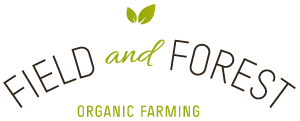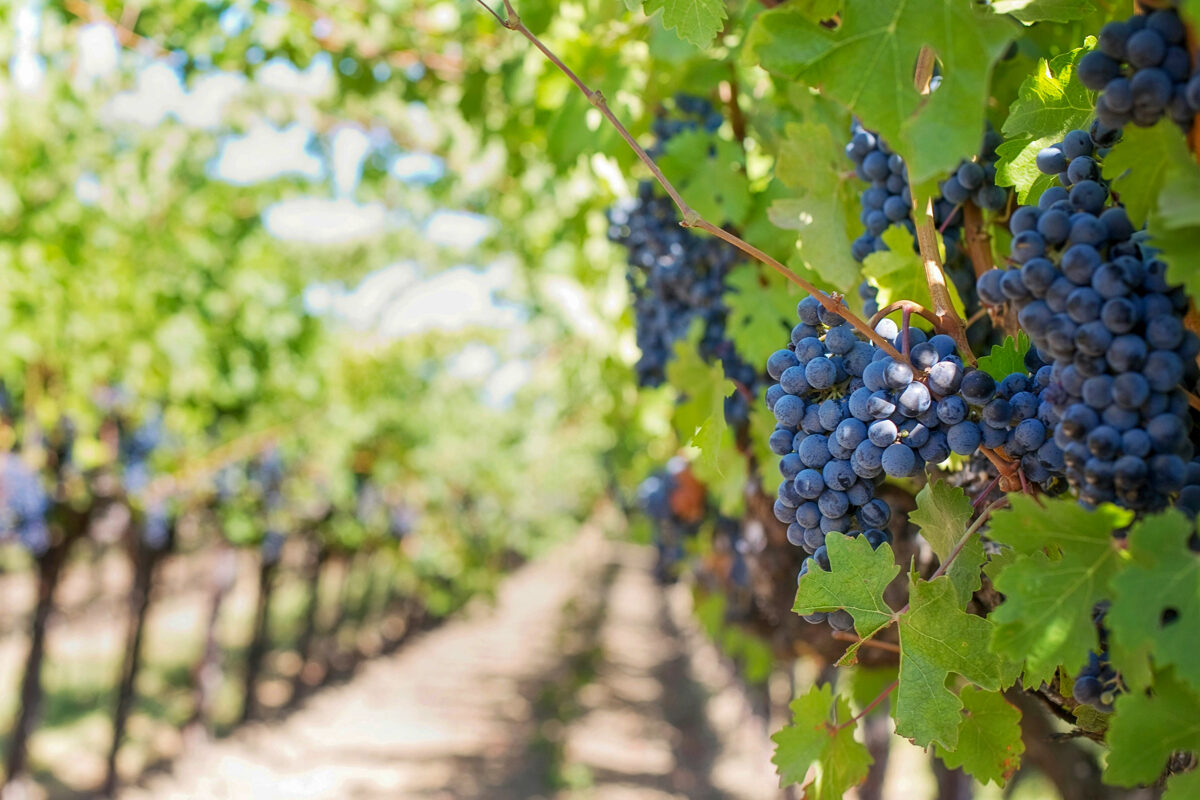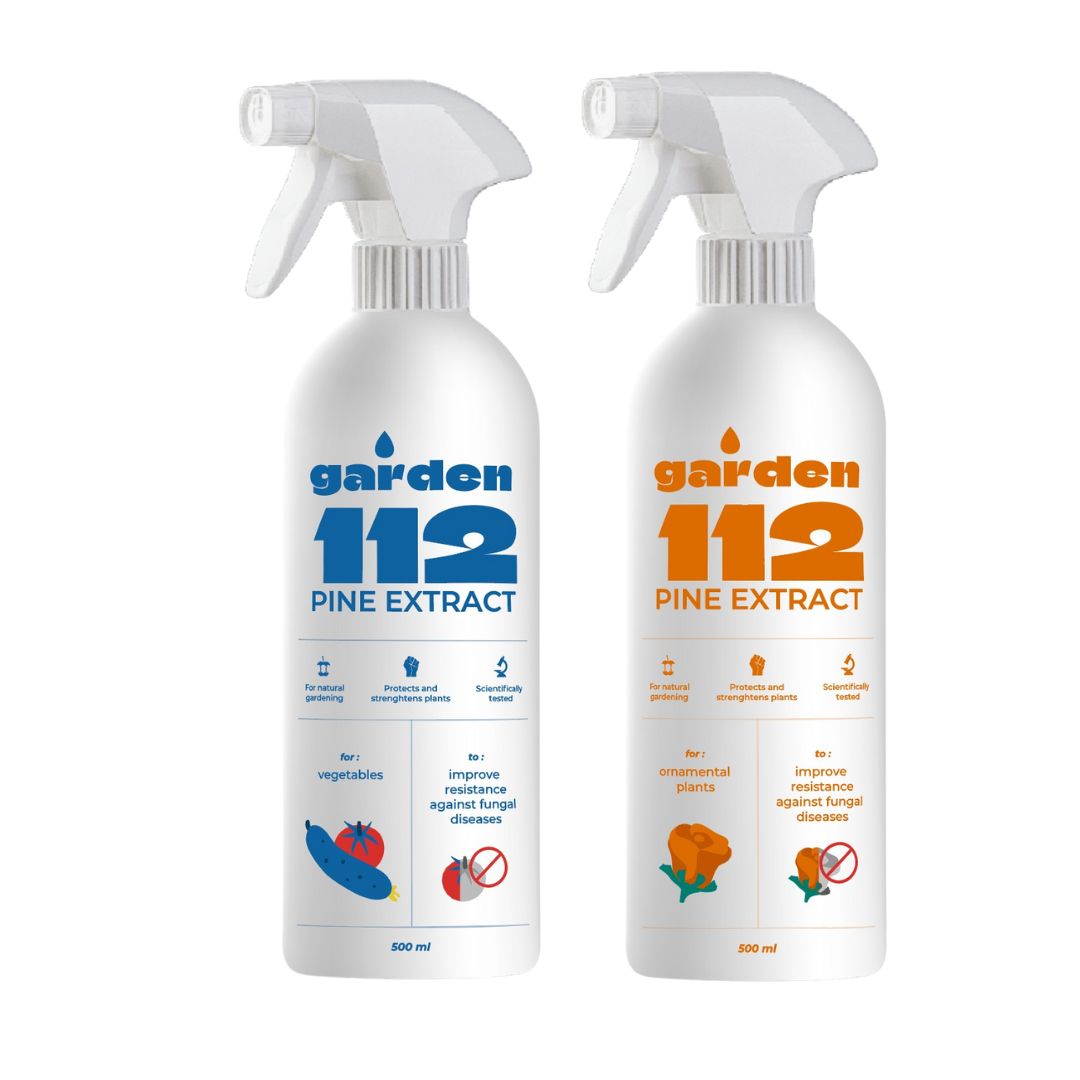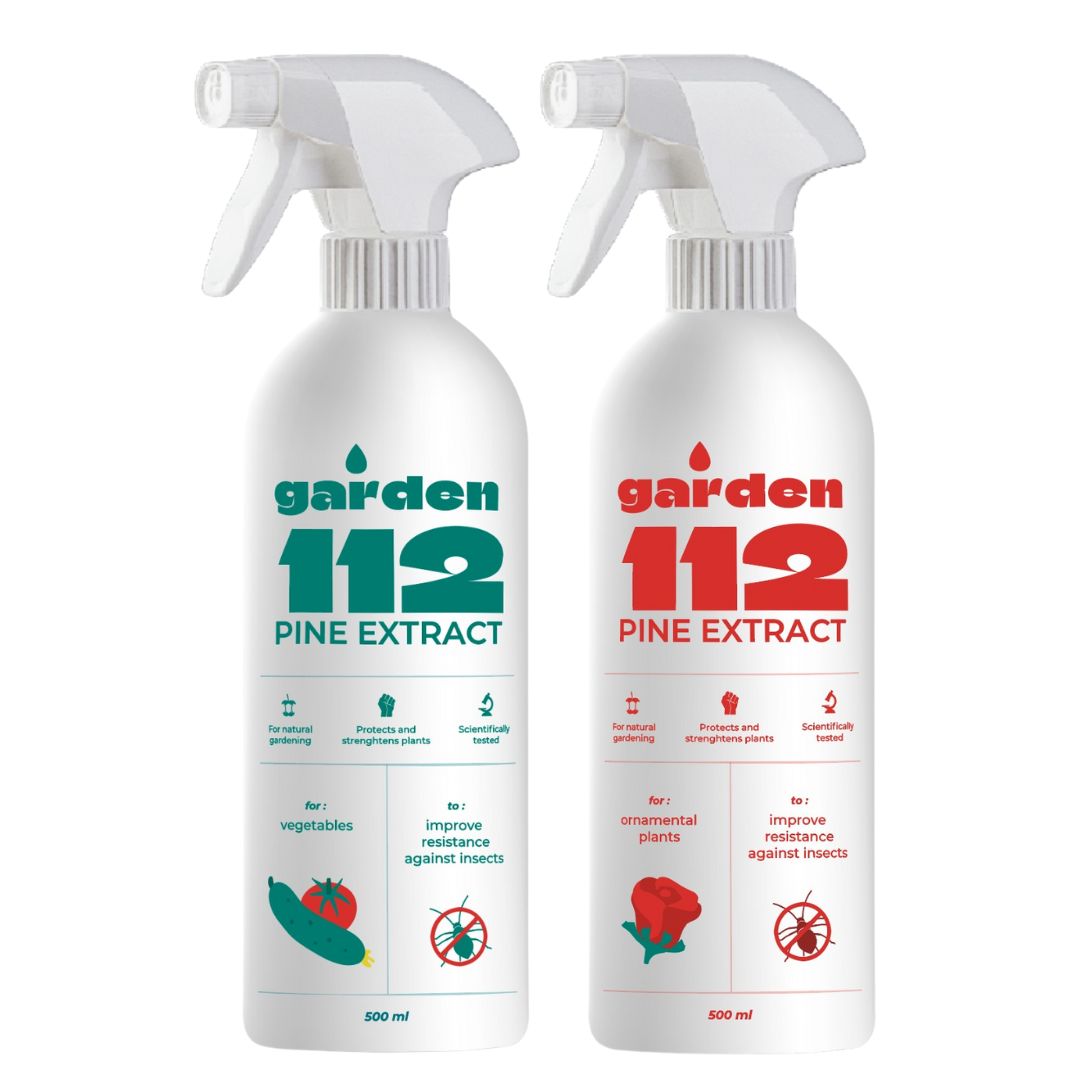Chamomile's journey from earth to essence
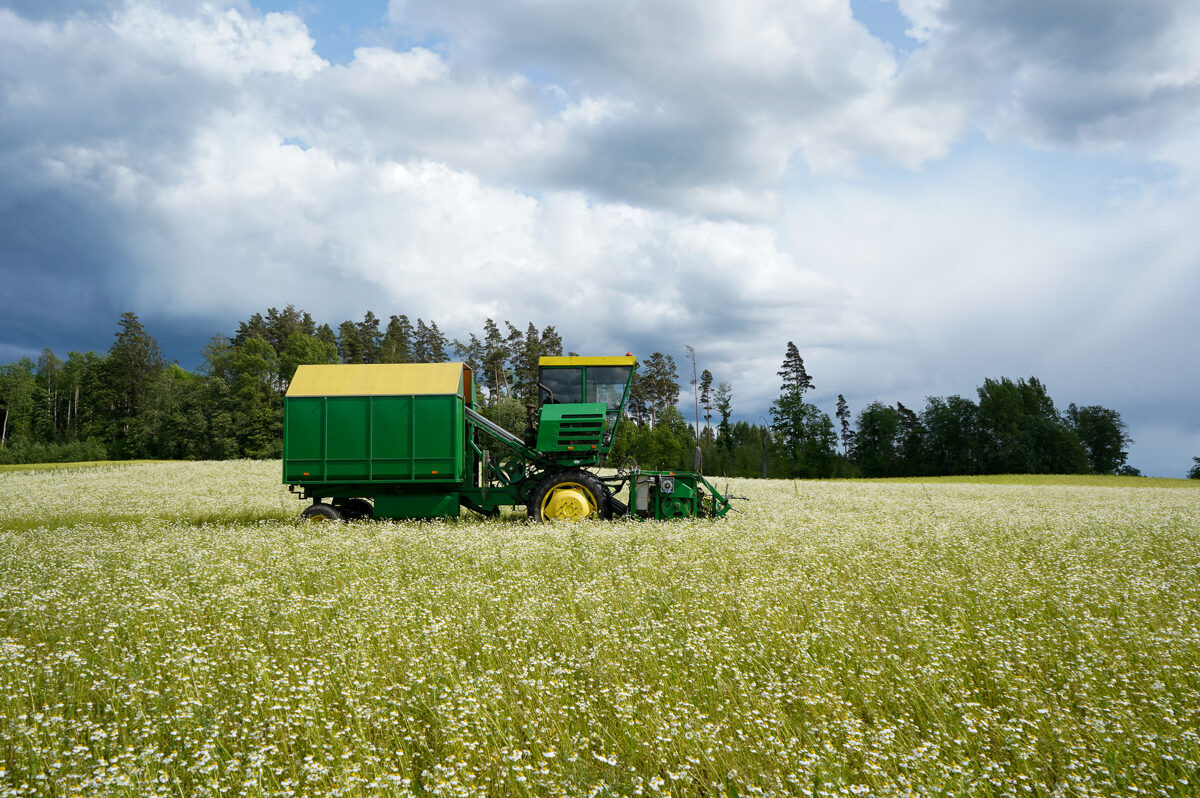
Accuracy in primary processing for rich chamomile essential oil and extract production

The entire processing facilities over 2200 square meters are managed with dedication to safety and quality, strictly adhering to HACCP food safety standards. Here we process a diverse array of medicinal plants, including chamomile, caraway, coriander, peppermint, dill along with the raw materials from companies organically certified forests like birch, spruce and pine.
Every incoming batch of raw chamomile is thoughtfully categorized. Application and specific chemical composition of the plant depends on the variety of chamomiles used. A portion of the harvest we processed into dried plant material, ready for various applications, while the remainder is meticulously prepared for the creation of various chamomile extracts, essential oil extraction, and production of hydrosols.
Controlled drying of medicinal plants for maximum potency
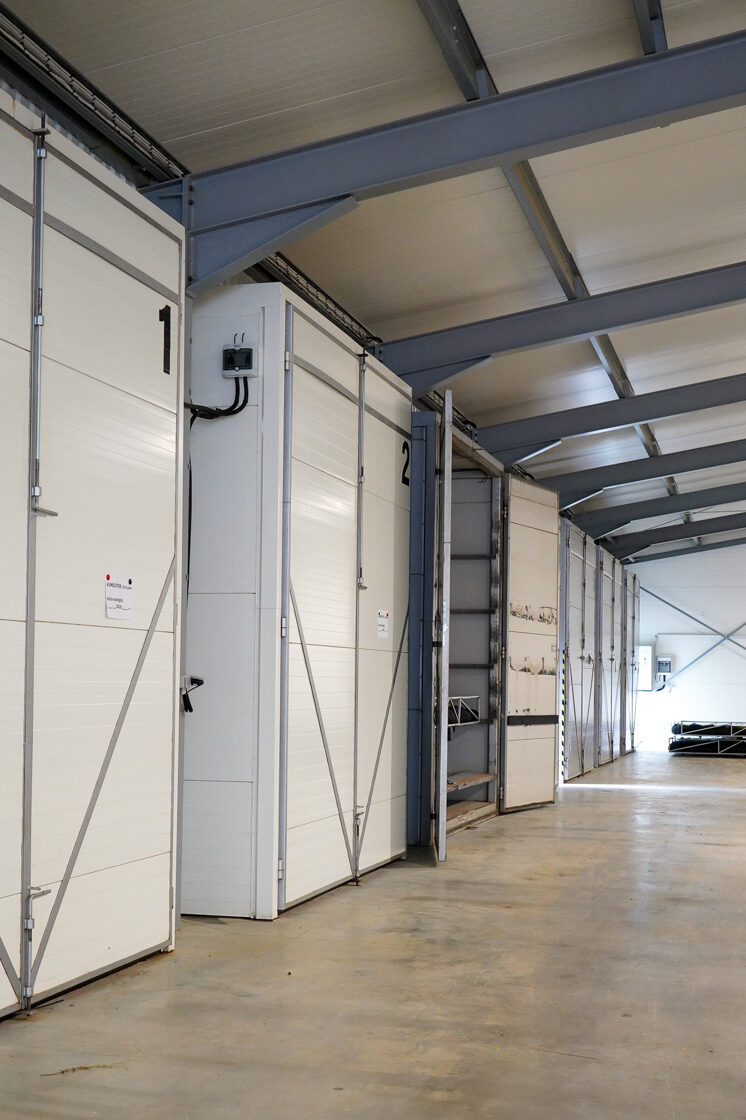
A
crucial step in the preparation of potent raw plant materials, especially for high
value chamomile essential oil, extract and hydrosol production, is the industrial
drying process. Company utilizes large driers, with an impressive capacity of thirty
tons per day, to gently reduce moisture content. To ensure optimum results and
preserve the maximum concentration of chamomile's active compounds, the drying
temperature is carefully maintained. The moisture levels are constantly
controlled via hygrostats allowing a precise control of the process. Depending
on the initial moisture content of the chamomile plants, this phase could take
around 30 hours and
results in dry medicinal plant material with moisture up to 12% according to the
European Pharmacopeia standard, for optimum product quality and longevity. This
precise control guarantees that chamomile's natural integrity and therapeutic
benefits are fully maintained.
Conclusion
Field and Forest, through the unwavering dedication to organic cultivation of chamomile, advanced processing techniques, and a commitment to environmental sustainability, consistently deliver premium products. Our specialty lies in producing high-value German essential oils, extracts, and hydrosols with precise and consistent chemical compositions. The company takes pride in meeting the strict standards of our B2B partners across a wide range of industries.Organic Chamomile Production with Full Control—From Field to Formula
Scale of German chamomile farming
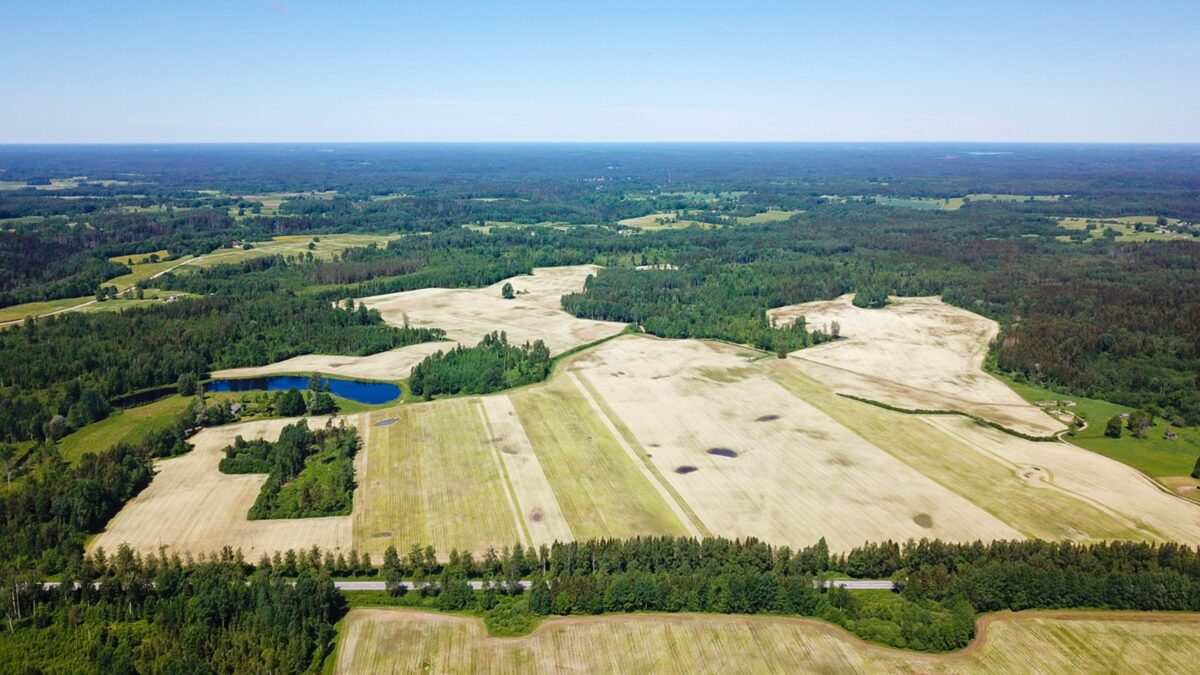
Traceability and transparency of organic medicinal plant materials
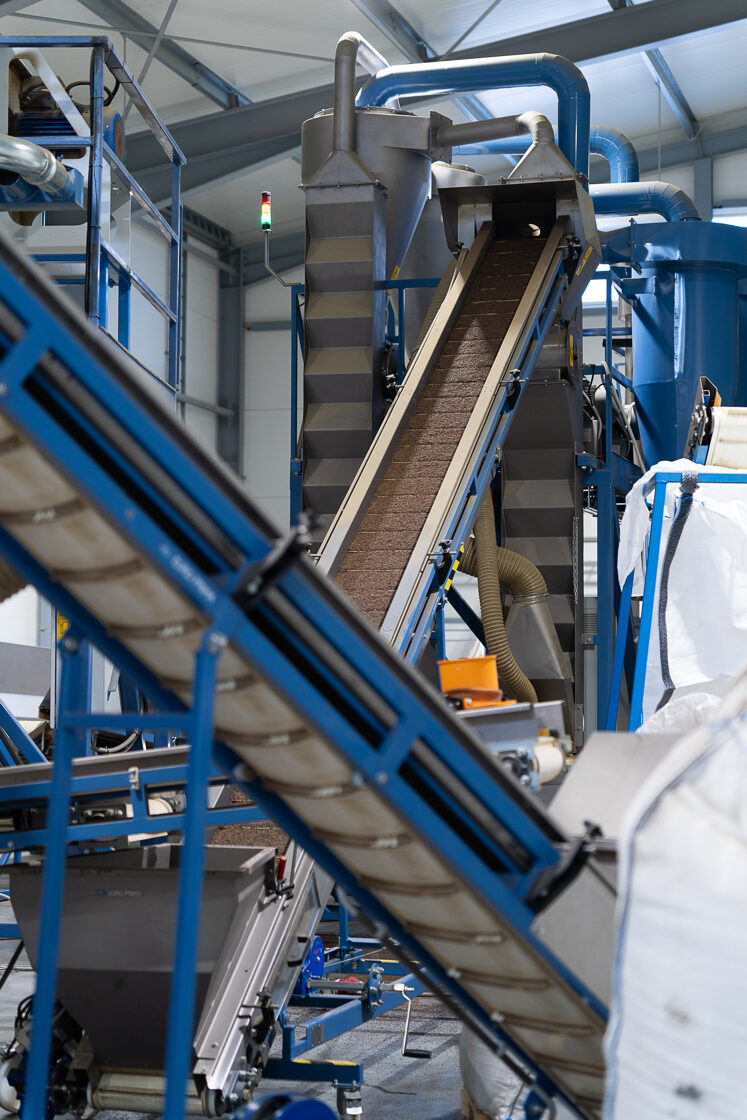
Certified German chamomile ingredients direct from the producer
Demand for pure and sustainable raw ingredients continues to rise. The company, as one of the leading Chamomile growers and producers in Northern Europe, continuously expands. All of company’s medicinal chamomile products are food grade quality and are processed in accordance with HACCP standards. Additionally, essential oils and hydrolates are Ecocert Greenlife certified as organic according to COSMOS standard.

Chamomile-derived ingredients such as essential oil, hydrolate and various blue chamomile extracts provide soothing, anti-inflammatory, and calming properties, making them highly in demand for sensitive skin and children’s product lines.
Pharmacopeia grade Organic Chamomile
With an in-house analytical laboratory at the company’s disposal, detailed chemical composition profiles of the various chamomile varieties we cultivate are available upon request. This resource allows us to offer products tailored to specific industry needs, including those requiring compliance with pharmacopoeia standards. Our organically grown chamomile ingredients can be supplied according to the specifications set by the European Pharmacopoeia (Ph. Eur.) standard, ensuring exceptional quality, safety, and consistency.
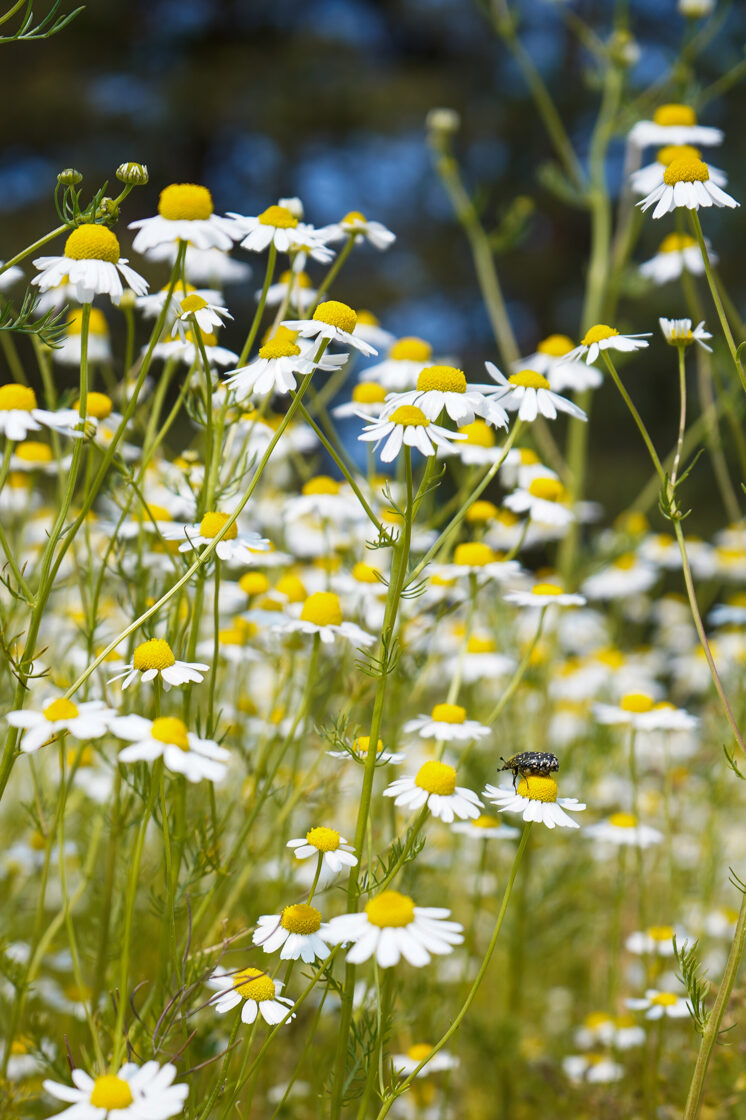
Conclusion
The company provides more than just organically certified raw chamomile, extracts and oils that meet HACCP food safety standards. In addition to Ecocert-certified chamomile products, FIELD AND FOREST also offers medicinal plant ingredients that comply with Pharmacopeia standards.
Our target is about producing better for the ecosystem, employees, and for the people who rely on chamomile’s healing properties every day.
In the FIELD AND FOREST’s organic fields, chamomiles grow at scale, and purity begins at the root.
Growing organic German chamomile – FIELD AND FOREST
At the heart of our company lies a deep-rooted commitment to nature, sustainability, and the powerful benefits of aromatic and medicinal plants, especially German chamomile (Matricaria recutita, Matricaria chamomilla) or blue chamomile. Organic German chamomile is the main and one of the prime crops FIELD AND FOREST grows in companies own fields in Northern Europe Latvia.

Leading in Northern Europe
With over 500 hectares of certified organic fields dedicated to chamomile medicinal plants for various such product production as:
· chamomile extraction cut,
· chamomile tubular flowers (pulvis),
· chamomile ligulate flowers (white petals),
· chamomile essential oil,
· chamomile hydrolate,
· various chamomile extracts.
Spreading in Vidzeme region, we are proud to be one of the largest producers of organic chamomiles in the Northern Europe —and a trusted partner to brands and buyers worldwide seeking the highest standards in botanical ingredients.
Chamomile for B2B: Large Volumes, Custom Options
At FIELD AND FOREST, we specialize in B2B approach, offering large-scale wholesale supply solutions that meet the specific needs of our long-term partners. As both a grower and processor, we are equipped to deliver multi-ton and full truckload orders. The chamomile products along with other medicinal plants and herbs are processed in more than 2200 square meter food grade production site according to HACCP standard. An important factor in trading with medicinal plants is their active ingredients. This is why our various chamomile products can be standardized in terms of chemical composition, depending on the variety and other factors, ensuring alignment with each client’s desired specifications for active compounds or end-use applications of the raw materials of the chamomile plant, chamomile essential oil or chamomile extracts.

Expertise in chamomile farming
It all started in Year 2005 with first fields of chamomile and other medicinal and aromatic plants. The growing season of chamomile starts before the spring sunshine, to ensure the best possible germination. It is usually sown on the cooling days of autumn the previous year, for an abundant next year’s harvest. The work on the chamomile fields usually starts in early spring with an inspection of the autumn sowing quality. The Nordic climate in Latvia ensures the production of most rich and abundant composition of active ingredients in the plants cultivated.
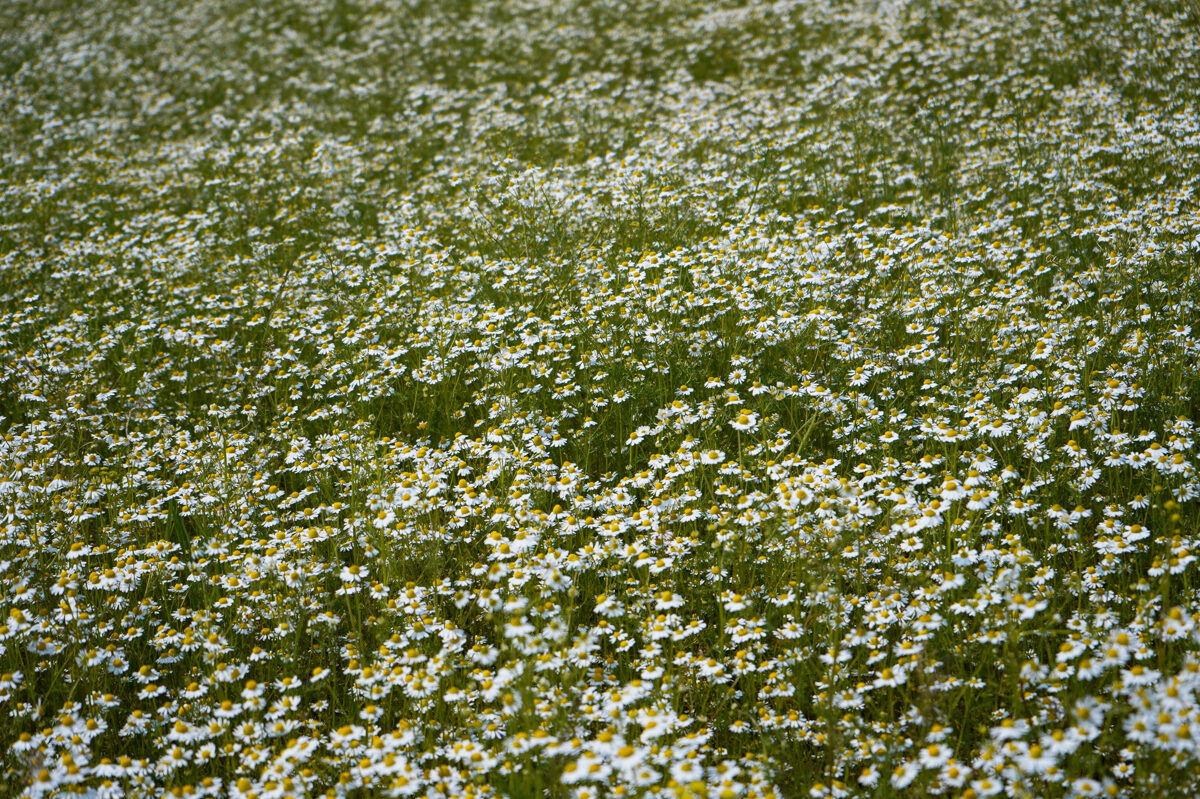 Commitment to pure organically certified chamomile
Commitment to pure organically certified chamomile
The company is cultivating organically certified chamomile according to Council Regulation (EU) 2018/848 and Commission Regulation (EC) No 889/2008 on a large scale. The continuously growing farmed chamomile fields is a demonstration of years of expertise and a long-term vision. All the organic fields are managed with utmost precision, using technologies for optimal land use and precise sowing methods for maximum chamomile harvest and highest quality chamomile products outcome for our B2B clients.
Blue chamomile grown right
Starting with quality seed material selection and regenerative soil management practices, blue Chamomile essential oil, chamomile extracts, hydrosols and dried materials by FIELD AND FOREST have a rich bioactive ingredients composition. These steps allow our medicinal plants to thrive without compromising biodiversity or ecosystem balance. As a result, the crop grows resilient whilst giving high yields and rich composition of chamomile ingredients for food, cosmetics and pharmaceutical use.
Enhancing vineyard health and wine quality with Fortisano - plant based approach for improved wine grape immunity
Strong immunity in wine grapes.
Different pathogens in vineyards are a major factor in impacting the taste, quality and spoilage of vines produced from such grapes. Even more so for sparkling wines the foamability is greatly influenced by various microorganisms in grapes used. Poor plant immunity increases costs for sorting and disposal of damaged bunches.
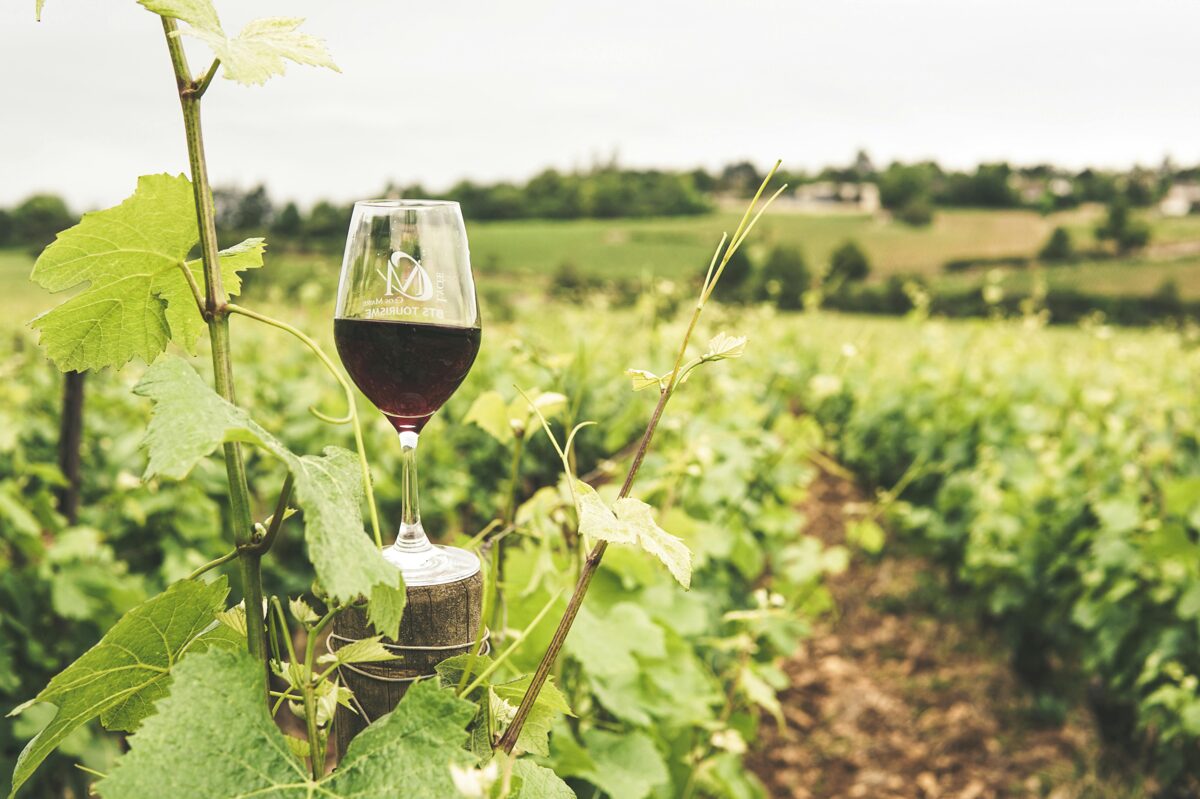
The negative impact of using infected wine grapes in wine production include:
- a risk for enzymatic oxidation, impacting color, flavor and other wine characteristics,
- risk in reduced sugar, acid and polyphenol levels,
- increased risk of problematic alcoholic fermentations,
- presence of moldy character in wine,
- reduced storage stability.
Mostly infection of young shoots, blossoms and leaves occur in late spring during moist conditions. Disease can become visible and develop when the fruits reach certain sugar levels that are required for the fungus to grow.
Fortisano - Plant growth improver.
Fortisano is an advanced botanical solution designed to enhance the resilience and vitality of wine grapes, especially in fighting Botrytis cinerea fungal infections. Developed by FIELD AND FOREST in a microbiology laboratory, produced in food-grade facilities using innovative, sustainable processing methods, tested in certified vineyards, Fortisano supports organic, eco-friendly viticulture.
Plant growth improver for elevated wine qualities.
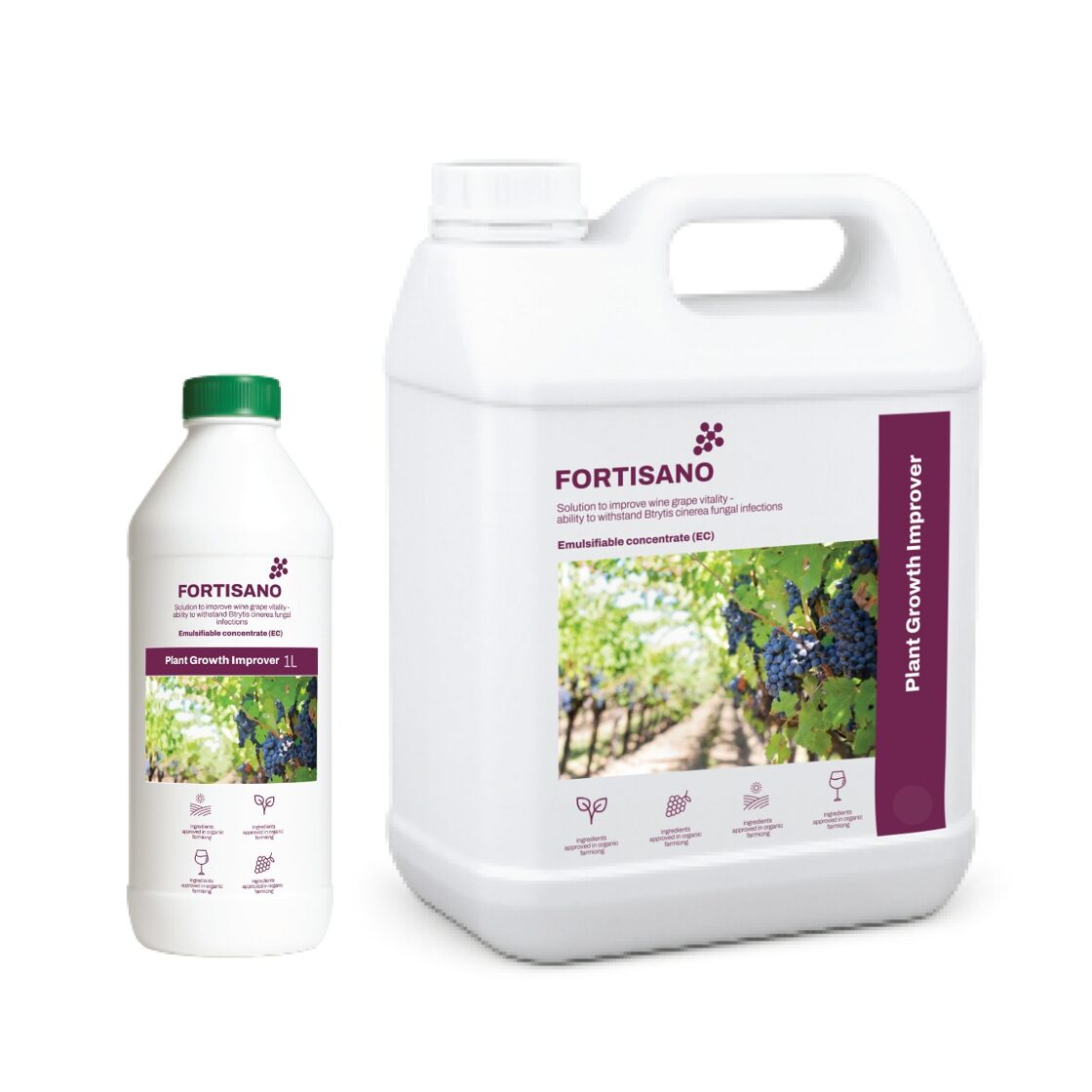
- scientifically proven, backed by both in vivo and in vitro laboratory testing,
- tested in certified vineyards,
- works without triggering fungal resistance,
- tested in Vinification Trials, ensuring compatibility with winemaking processes and improved wine qualities,
- safe for people and pets.
Grow healthy vines and make quality wine.
This plant growth improver creates ideal conditions for health and vitality of vineyards. Developed and tested in field conditions, with proven efficacy on improved plant resilience, immunity and ability to withstand Botrytis cinerea infections. Sustainable vineyard management includes proper vine pruning, vineyard floor management, green pruning, thinning of leaves around the bunches and plant growth improver application from development of fruits to harvest. For weather-based infections risk minimization during fruit development, additional leaf removal around the bunches and plant growth improver application is advised.
Fortisano delivers effective, sustainable vineyard health improvement naturally. With a minimum of 1 up to 4 applications per season, it will help maintain vineyards vitality and immunity.
Find more details on the product HERE.
Garden 112 – Boost plants natural ability to withstand fungal diseases.
Researchers at FIELD AND FOREST have found and formulated the perfect solution for plant health - Garden 112.
With gardening season in full bloom, comes the many responsibilities of the gardener. No matter if you are growing lush vegetables, fruits and berries or beautiful ornamentals, in certain climate conditions fungal diseases are a natural guest in the garden. It is a frustrating enemy, as in wet summers it strikes hard and spreads fast threatening the entire harvest.
There are two sides of Garden 112, with one of them strengthening plants natural ability to withstand fungal diseases like mildew, gray mold, fusarium. Garden 112 fungistatic is a biological, plant-based fungistatic spray that supports plants natural defenses and boosts their immunity system through which it will withstand various such diseases.
Garden 112 - boost your garden all season long.
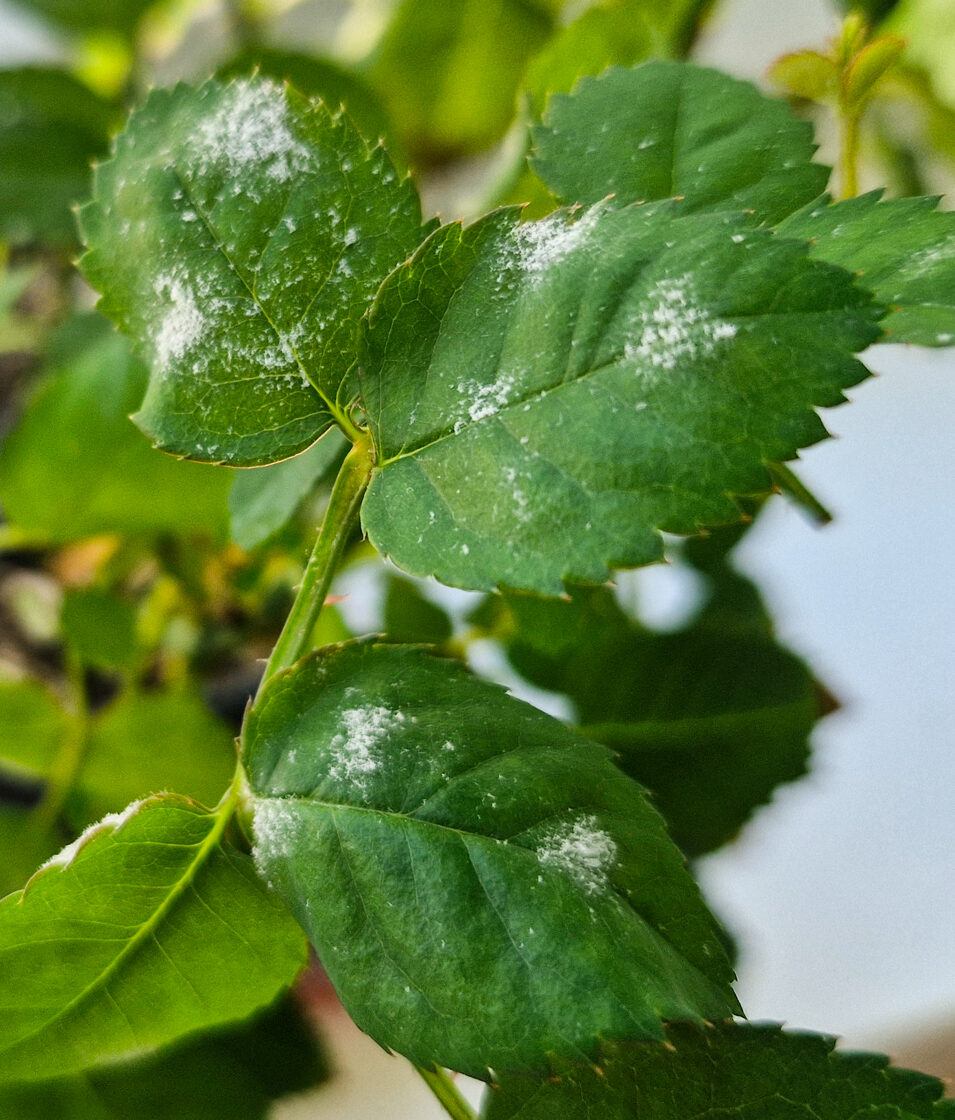
Powdery Mildew on roses in FIELD AND FOREST microbiology laboratory.
Garden 112 delivers natural, non-toxic solutions for improved immunity of edible plants and ornamentals in their ability to withstand diseases like:
- Mildew - Show up as white spots, that usually affect the leafy foliage of the plants like apples, blackcurrants, gooseberries, grapes, peas and cucurbits - courgettis, marrows and cucumbers. Most affected ornamentals are in the daisy family, rhododendrons, delphiniums, phlox, honeysuckle, roses and even oak trees.
- Mold is easy to spot for the grey fussy coating, caused by Botrytis cinerea fungi. Its wide spectrum of host plants makes this one of the most common fungal diseases. Most damage from mold usually affects plants already under stress and weaker plants but will affect healthy ones as well. Commonly affects strawberries, grapes, blackberries, raspberries, gooseberries, and vegetable plants like beans, courgettis, cucumbers, lettuces, even tomatoes. Fruits of infected plants may rot and decay as they ripen. Damaging chrysanthemums, pelargoniums, primulas and wide range of other ornamental plants.
- Fusarium - soil born fungal disease, causing plant water vessels to die and with it the plant itself. Host plants include tomatoes, legumes, runner beans, pes, cucurbits, lettuce, and ornamentals including crocus, gladiolus, hyacinth, iris, tulip, lily, narcissus, and ranunculus.
Garden 112 benefits:
- 100% Natural and safe for humans and pets
- Effective and lasting, easy spray on application every 3-5 days
- No chemical residue
- Boosts plants immunity during every stage of growth
- No risk at developing resistance
- Unspoiled harvest in field conditions, raised beds and greenhouses
- Increased plant vitality creating long term resilience even in challenging weather conditions
Help Your Garden Naturally.


Boosting action of the product helps in maintaining plants vitality and strengthening their immune system. Creating stronger plants for a healthier garden, brighter blooms and larger harvest. Most fungal issues arise during humid, rainy weeks - that is where Garden 112 shines. Don’t let fungal diseases steal another season's harvest, protect what you’ve worked so hard to grow. Improve your gardens health naturally.
Find out more HERE.
No more pests in your garden - Field and Forest developed plant-based solution.
Garden 112 - Natural solution for healthy garden
In every garden, there is a dream of lush and abundant harvest. But with sunny days of spring, the garden season also starts for the aphids, whiteflies, thrips and fruit flies. And so the dream of vibrant garden turns into a stressful routine. For gardeners these persistent pests aren't just damaging vegetable's and berries, even roses and other ornamental plants enchanting the garden, are being tortured by persistent attacks.To fight this bad luck of pests you try everything from chemical insecticides to DIY natural recipes, yet nothing really offers safe and effective results that lasts.
For the self-conscious gardener looking for environmentally friendly, chemical free, all-season easy to use solution - Garden 112 is the secret weapon we all have been waiting for.
A plant vitality booster backed by botanical science
Garden 112 is produced by Field and Forest after dedicated research of repellent activity of natural substances in collaboration with The Institute for Environmental Solutions. Years of testing and product development have resulted in plant-based insect repellant for every gardener's needs. The action of the product lies in boosting natural abilities of the plant to fight against the attacks of pests. It works in harmony with nature, restoring your plants' natural defenses and creating a stable environment across every stage of growth.
Aphids on a cabbage (on the left) and roses, whiteflies on a cucumber leaves on the right.
To best meet different growing environments, Garden 112 is formulated for garden produce like vegetables, garden berries, fruit trees and ornamental plants, roses included. Replace any aggressive chemicals you have been using with this gentle, yet powerful blend of pine and caraway extracts combined with plant lecithin.
This union provides wide-spectrum action in fighting for Pest free garden with the ability to repel:
- Aphids is very common and widespread pest in open vegetation. Can affect almost any plant, vegetable and ornamental.
- Whiteflies are a common greenhouse pest, mostly affecting plants like sweet pepper, tomatoes, cucumbers, aubergines. With great taste for ornamental species of Fuchsia, Gerbera, Pelargonium, Solanum, chrysanthemums, poinsettias and primulas.
- Thrips due to they're small size and rapid reproduction have become very widespread on the fields of agricultural cultures and in the greenhouses alike, mainly in colder Northern areas. The damages might become very impactful for fields of tomatoes, capsicums, cucumbers and strawberries. Often thrips have been found to damage apples, apricots, peaches, nectarines and plums, peas, melons, lucerne, grapes and potatoes, along with ornamental plants such as roses, chrysanthemums, carnations, sweet peas, Gladiolus, Impatiens, Gerbera and Ranunculus.
- Fruit flies prefer ripe fruits, berries and vegetables like cucurbits, cherries, peaches,
grapes, raspberries, blackberries and blueberries and more, especially if there
is slight damage to the fruit’s skin, along with various ornamentals. There are examples where the damage can come to a 100% of produce.
Eco-Friendly and Effective
Gardeners are becoming conscious of what they choose to use on their growing produce and ornamental parts of the garden. This is important not just for the health and nutritional value of the plants, but for the well-being of children, pets, and the environment.
 Garden 112 provides all the benefits:
Garden 112 provides all the benefits:
- consistent results from the first week of use,
- safe, plant-based organic ingredients with zero chemical residue,
- easy to use application, just spray every 3-5 days,
- tailored product for both edible and ornamental plants.
Find out more details about the product HERE.
Field and Forest to showcase state of the art botanical science at the Macfrut 2025!
Field and Forest is prepared to take the latest innovations in BioSolutions to Macfrut 2025, held in Rimini, Italy from May 6-8.
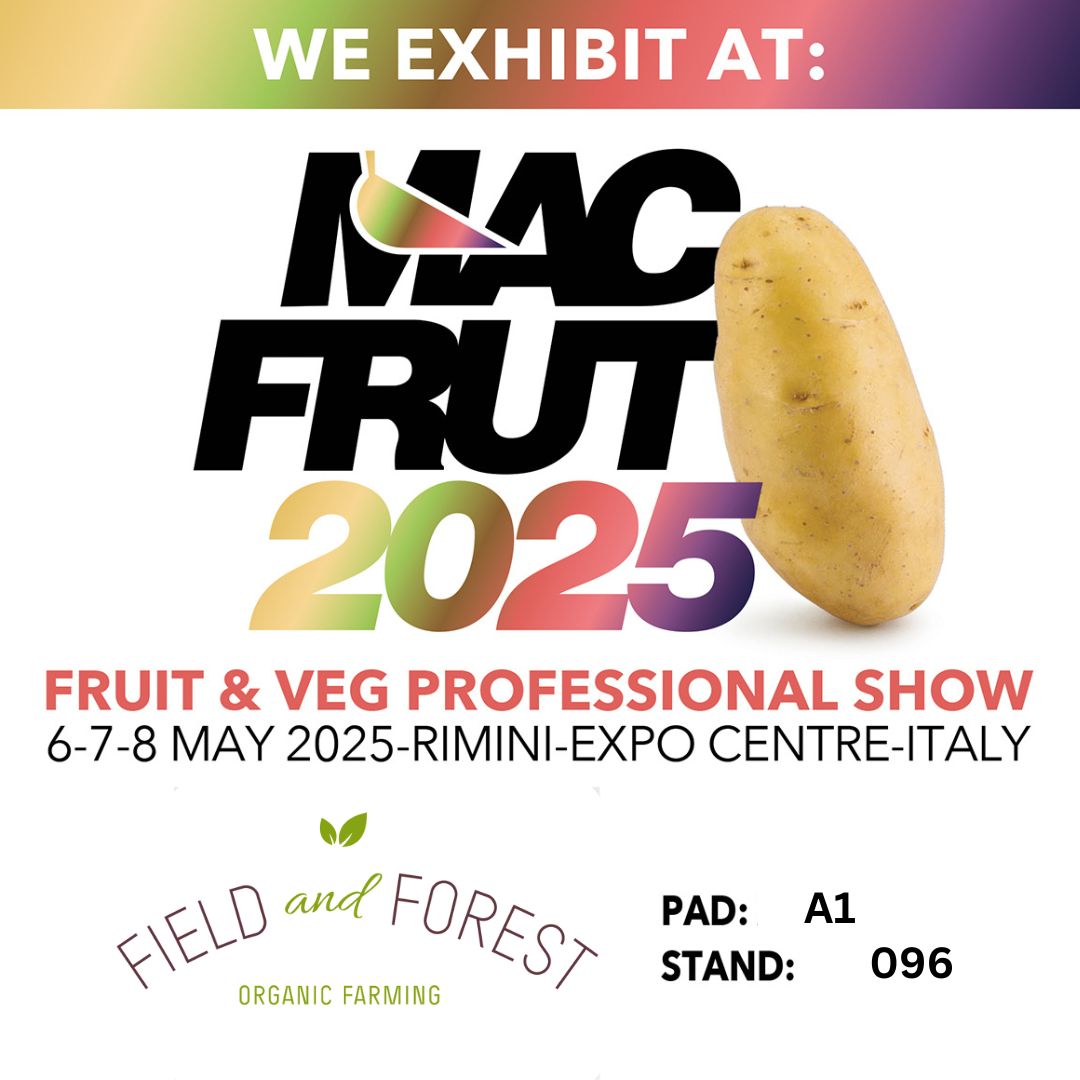
As a vital platform and meeting point for the entire network of food supply chain, Macfruit gathers every link in the agricultural value chain from growers, innovators, researchers, suppliers and retailers. With great pleasure we bring F&F researchers latest breakthroughs in natural plant protection to this vibrant international stage.
As a major players of the Organic industry in the field of medicinal plants and organic forests, our research aims at finding ways to develop natural solutions for plant vitality while staying aligned with nature.
It has to be effective, sustainable and safe not only for the end consumer of the products, but also for the environment. The researchers at Field and Forest have delivered even more!
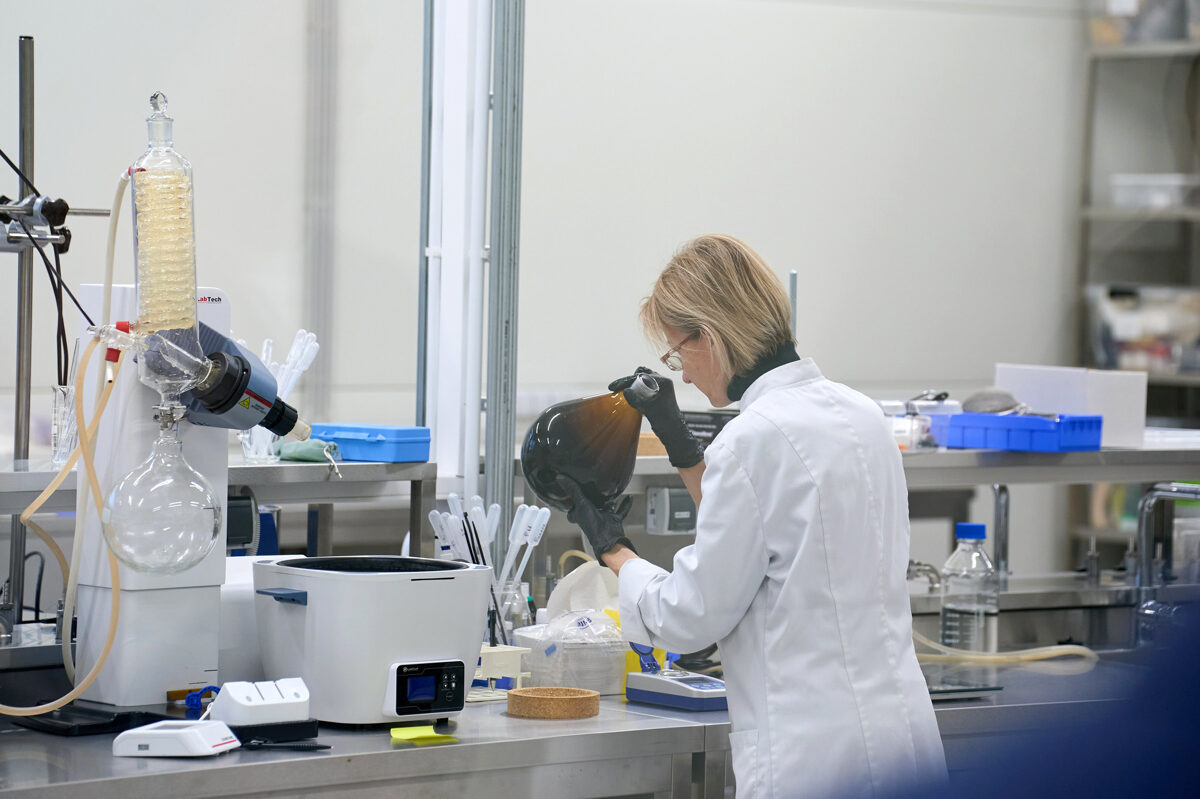
The innovations we’ll be presenting at Macfrut are result of years of research, product development and field tests.
Visit us at Macfrut 2025 and learn more about how Field and Forest is shaping the future of farming.
See you in Rimini!
Meet Field and Forest Ltd at BIOFACH 2025!
From 11 – 14 February 2025, the global organic industry meets at BIOFACH, world’s leading trade fair for organic products, in Nuremberg and online. Field and Forest Ltd (FAF) is taking the opportunity to be amongst the 3700+ participants.
We are prepared to introduce, meet, network, and first of all - present our latest product – 100% natural and organic sauna essences.
Visit us at Hall 4A Booth 4A-531 for more detailed information on our organic product range.
In response to the growing demand for pure, organic ingredients, FAF is ready to shape the future of organic relaxation. With the scientific approach, that is the cornerstone of the work we do, our product development team, has created a unique product for public and private Saunas.
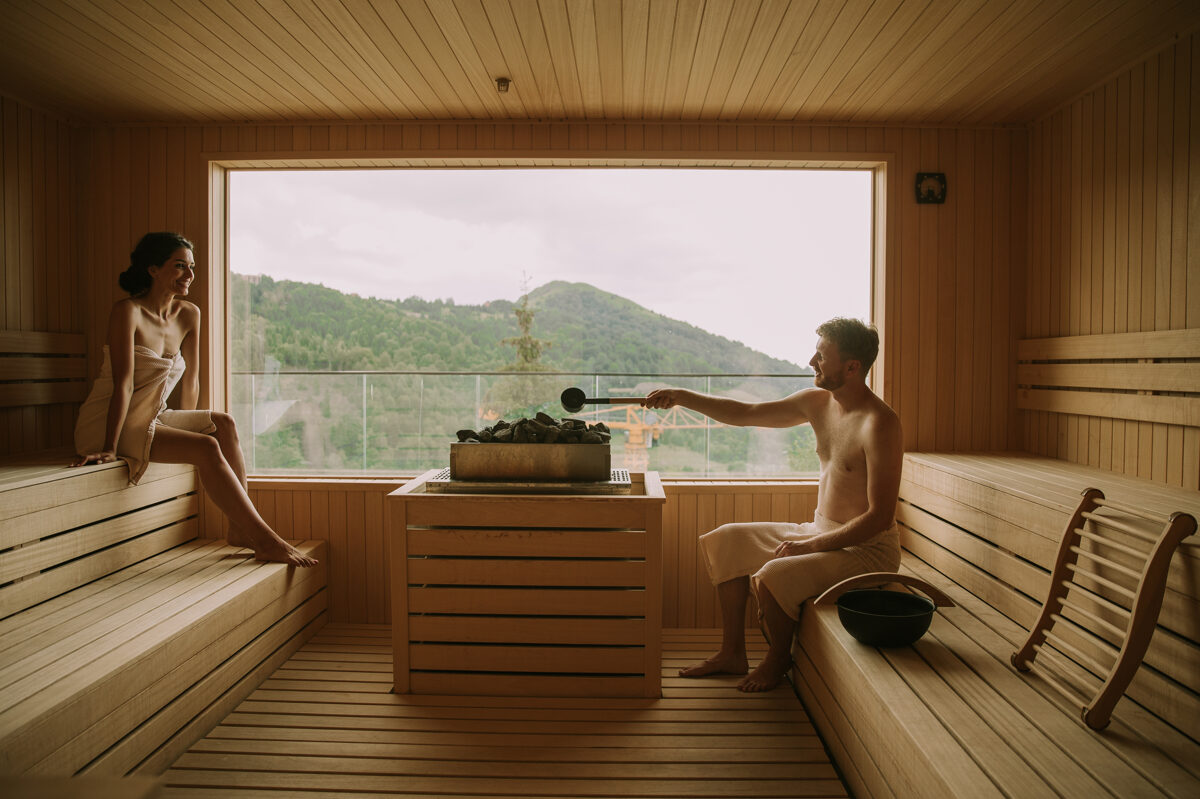
Taking great inspiration in Nordic sauna tradition’s and culture, our team has formulated a product that brings together the best of the heritage plants in Northern Europe’s region.
Take the chance to explore our sauna product range:
Relaxing Birch – for a soothing sauna ritual,
Strengthening Pine – to invigorate and refresh,
Grounding Spruce – for a deep, balancing effect,
Energizing Peppermint – for a revitalizing boost.
This is a great opportunity to meet like-minded companies, innovators, newcomers and pioneers of organic industries. Join the BIOFACH 2025! Schedule a meeting with us to discuss collaboration opportunitiesfurther.
Field and Forest sauna essence: Tradition Sourced from Nature.
Field and Forest Ltd (FAF) is introducing new product - 100 % natural sauna essence developed from our own farmed organic raw materials

Organically certified medicinal plant aromas and bioactive ingredients are the main point of focus when creating these products. The sauna product utilizes ingredients sourced from responsibly managed organic forests and cultivated organic farm fields. FAF has collected a wide range of experiences in extraction and distillation of plant materials, the abundant source of sauna essence ingredients.
We offer the natural essence of birch, pine, spruce, chamomile, and peppermint. Natural sauna essences are approved for use on hot sauna stones by more than 1000 users in public and private saunas. We guarantee traceability, naturalness, purity and batch-to-batch repeatability of our products.
FAF sauna product line includes:
Relaxing Birch sauna essence – deeply rejuvenating activity. With its fresh, spring-like scent, this sauna essence brings with it a sense of new beginnings. With active compounds working well on mood enhancing and relaxation.
Strengthening Pine sauna essence – gives the feel of a walk in the Nordic Forest. Help to clear the airways, mind and energize the body. Overall uplifting sauna experience.
Grounding Spruce sauna essence – will help in reconnecting with the body and be in the present. Stimulates the immune system, deep relaxation, and sense of self.
Energizing Peppermint sauna essence – offers an invigorating and refreshing sauna experience. Awakens senses and stimulates mind and body.

Product research and development is vigorously evaluated. Our products are aimed at discerning clientele with elite standards, requests for pure ingredients and sustainable practices.
FAF product development team has been working on the sauna product line for 3 years. This includes quality control testing for product purity, safety testing for allergens and stability, and long-term performance and consumer testing. Assembling product specific focus groups for collecting usage feedback and comparative insights. This demanding work has resulted in a unique product, a blend of holistic and scientific approach.
Ancient wisdom is blended with modern science in these elevated sauna products. Research and development is conducted in FAF analytical laboratory, equipped with HPLC-UV, HPLC-QTOF, HS-GC-MS, GC-FID, GC-MS, MP-AES, LC-UV-MS and other world class analytical tools
Experience the FAF Difference
The Sauna essences are designed to enhance unforgettable experience and promote traditional, and natural sauna rituals. Harness benefits of organic ingredients, promoting relaxation, stress reduction, and overall wellbeing. Create sanctuary of rejuvenation with FAF’s premium essences.
Sauna essence ingredients are derived from organic, Ecocert Greenlife certified as organic according to COSMOS standard, including FSC certified forestland. Different types of product certification possible.
Contact us today to learn more about our exclusive line of sauna essences and discover how to elevate your spa offerings.
The Essence of the Sauna: Field and Forest’s Organic Approach to Relaxation.
How Field and Forest came to the Idea of creating a unique line of sauna essences?
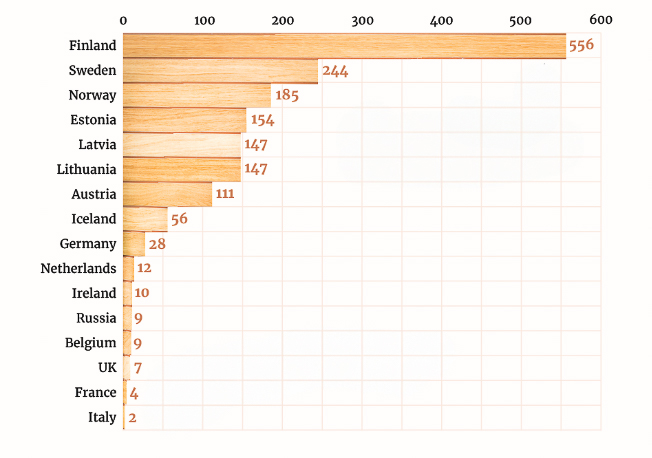
Sauna is a sanctuary in Nordic cultures. The cleanest, most sterile, heartfelt place. Safe haven for the people, especially in the harsh Nordic winter conditions. The research team at Field and Forest Ltd (FAF) have crafted natural sauna essences to bring this tradition to the next level of sophistication for the modern human to immerse and receive the benefits.

Harnessing Nature's Power
FAF is a certified organic farming company specialized in medicinal and aromatic plant cultivation in more than 600 ha and processing of herbal plants in 2000 square meters food grade production facility. Every year more than ten thousand tons of biomass are processed to produce herbal raw materials, essential oils, hydrolats and herbal plant extracts.
Northern region’s nutrient rich soils and harsh winters foster the development of plants with prominent levels of active compounds. The production team at FAF is carefully extracting these to contribute to the benefits of our sauna essences. This ensures that our sauna essences deliver a consistent and exceptional experience.
Beyond the Scent: A Scientific Approach
Using organic raw materials FAF research team have developed a new formula for an unforgettable relaxation experience and elite sauna spa treatment. Honoring the tradition of nature’s spa, FAF has created authentic sauna essences in the heritage aromas.
The market is saturated with different scents and aromas, that have questionable ingredients or fleeting fragrances. Let’s change this for good! The reason FAF has created sauna products is the commitment of quality sauna experience, constantly growing demand for organic high-quality products and our wide profile of organic plant material.
The benefit of sauna is not only for the health of a body, but also mental wellbeing. It is so important to choose the right ingredients for the most natural experience.
The FAF Difference: A Commitment to Quality and Sustainability
At FAF, we are passionate about sustainability and ethical practices. Commitment to organic farming and forestry practices ensures minimal environmental impact while maximizing the quality, saturation and purity of the sauna essence ingredients.
Contact us today to learn more about our exclusive line of sauna essences and discover how to elevate your spa offerings.Does caraway repel peach aphids: an article
The peach aphid (Myzus persicae) has posed a constant challenge to the vitality of economically significant crops. Over recent decades, this pest has developed resistance to various chemical pesticides, necessitating the exploration of alternative, environmentally friendly pest management solutions. One direction to explore is plant essential oils, which have been under scrutiny for their potential efficacy against these resilient pests.
In a recent study, researchers delved into the efficacy of caraway (Carum carvi L.) seed essential oils as a potential repellent against the green peach aphid. The study, conducted using a bridge method and white cabbage as host plants, aimed to assess the repellent properties of three different types of caraway essential oils against these aphids.

Peach aphid (Myzus persicae). Photo IES.
The analysis revealed promising outcomes. Each of the selected caraway essential oils exhibited varying degrees of repellence against the aphids, signifying their potential as a deterrent. Notably, the essential oil with the highest concentration of D-limonene, a key component, demonstrated the most substantial repellent effect, showcasing a Repellency Index of +41%. This effect remained stable for a considerable duration, extending up to 330 minutes.
However, incorporating various surfactants in the formulation resulted in a setback, dampening the repellent effect during the testing period and exposing the complexity of crafting a viable, effective formulation.
Despite this challenge, the study offers a beacon of hope in the realm of organic pest management. Caraway essential oil emerges as a potential tool in combating green peach aphids, albeit with the need for further research and refinement to formulate it into a practical, market-ready product.
Read more in the article “In Vivo Bioassay of the Repellent Activity of Caraway Essential Oil against Green Peach Aphid”, published on MDPI “Insects” Special Issue “New Formulations of Natural Substances against Insect Pests”!
The research is a part of the project “Essential oil distillation
waste streams as a potential source of sustainable plant-based repellent
products” (No. Nr. 1.1.1.1/20/A/096). It is developed as a part of the
European Regional Development Fund programme 1.1.1.1 measure “Support
for applied research” and specific objective 1.1.1 “Improve research and
innovation capacity and the ability of Latvian research institutions to
attract external funding, by investing in human capital and
infrastructure”
Biorefining project results presented at GENP 2022 congress in Croatia
On 27-28 October, The 4th International Congress on “Green Extraction of Natural Products” (GENP2022) took place in Poreč, Croatia. It was organized by the University of Zagreb Faculty of Food Technology and Biotechnology.
The results of Biorefinery project presented in the GA congress
The 70th International Congress and Annual Meeting of the Society for Medicinal Plant and Natural Product Research (GA) was held in Thessaloniki, Greece, from 28 to 31 August this year. The aim of the annual congress is to broaden the existing knowledge and gain new experience in the field of natural substances, their products and research, as well as to establish new contacts with the industry in other countries.
How are insect tests carried out in the Applied Entomology Laboratory of IES?
In our previous article on the project “Essential oil distillation waste streams as a potential source of sustainable plant-based repellent products” we looked at the path of plant processing by-products, from seemingly low-value biomass to valuable water extracts, this time let’s explore the next step in the process – insect testing. Kristīne Berķe-Ļubinska, Head of the Laboratory of Applied Entomology of the Institute of Environmental Solutions, will guide us through this section of the project.
A repelling innovation: insect repellents from the waste of essential oil production
Zero-waste - Although this phrase suggests shopping in bulk, waste-free and strictly restricting consumption, this bioeconomy concept is particularly effective when implemented in a production environment. For example, materials that have before been written off as waste are now seen as potential raw materials for the development of innovative products. At the moment, at the Institute of Environmental Solutions, we give meaningful second life to the production by-products of our partners, the leading Baltic medicinal and aromatic plant grower "Field and Forest".
Developing cosmetic ingredient formulas from SIA “Field and Forest” extraction by-products
For a year already, Northern Europe’s
leading cosmetic and medicinal plant farming experts SIA “Field and
Forest” have been cooperating with the researchers of Institute for
Environmental Solutions and natural cosmetics raw material producer
SIA “Alternative plants”. The aim is to use secondary products
derived from a production process for developing new value-added
products for cosmetics industry.
Propagation of endangered plant species in IES’s climate control chamber
IES has developed a specially equipped climate control chamber for propagation of endangered medicinal and aromatic plants. The climate chamber helps to prepare the plants for further cultivation in organic farming.
